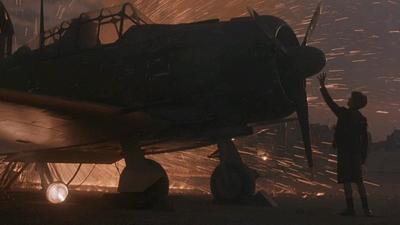
It may be a testament to how impressed I was with Batman Begins that I have begun digging up earlier films by the guys who made that movie. A few days ago I finally got around to watching director Christopher Nolan’s first film, Following (1998), and then yesterday, I borrowed Steven Spielberg’s Empire of the Sun (1987) from the library because I had not seen the film since it was brand new and I wanted to go back and remember what Christian Bale was like when he was first starting out as a child actor.
And gadzooks. Having seen Bale undergo such drastic physical transformations in his more recent films — from the rather buff star of American Psycho (2000) and Reign of Fire (2002; my review) to the alarmingly skeletal star of The Machinist (2004; my comments) and back again to the buff Dark Knight — it’s interesting to see how he has transformed, and yet remained utterly himself, in a more natural way, from childhood to adulthood.
Despite seeing the film only once, I did buy the soundtrack way back when, and I listened to it a lot about 10-15 years ago. It was interesting to hear those themes again, and in film order rather than album order, and to see the visuals that go with them.
And gosh, what visuals. They’re almost too good, in fact. I was 17 — half my age now, come to think of it — the other time I saw this film, and I remember thinking it was full of beautiful visuals and striking symbolism but I wasn’t sure what it all meant. FWIW, echoes of those thoughts still pass through my mind; some images are just so jaw-droppingly good that they take me out of the movie. You are so aware of Spielberg trying to impress you that you lose sight of what’s supposed to lie beneath these gestures.
The I-miss-my-mother stuff and composer John Williams’s use of the piano, especially in the early scenes, are like a premonition of A.I. Artificial Intelligence (2001; my BCCN review; my CT review; my Vancouver Sun article). And the way society goes nuts and people suddenly become selfish and Bale has to live on his own in the family home — taking advantage of the opportunity to break social conventions by riding his bike through the dining room, etc. — bring to mind the apocalyptic overtones of more recent Spielberg films like War of the Worlds (2005), albeit in a milder form. And of course, the World War II setting and the boy’s fascination with airplanes are right up Spielberg’s alley.
There is some interesting God-talk in this film, as there is in many of Spielberg’s films. Near the beginning, when everything’s still cozy, Bale suggests to his mother that God lives in our dreams and we live in his; shortly afterward, he tells one of his father’s friends that he’s an “atheist”. Then, near the very end, a character happens to die moments before an A-bomb goes off on the horizon, and Bale thinks it’s the character’s soul going up to heaven; when he hears later on that it was only a new kind of bomb, he describes it as a bright light in the sky, “like God taking a photograph.”
(And is there any spiritual significance to the song that Bale sings in the choir at the beginning of the film — a song that is reprised at several points later on? Are the lyrics available anywhere, I wonder? FWIW, there is also another song that plays over the closing credits — and in a few of the earlier scenes — in which the singers appear to repeat the word “Hallelujah” a fair bit.)
I had completely forgotten that Joe Pantoliano (who had played a bad guy in the Spielberg-produced The Goonies) and Ben Stiller (!) play John Malkovich’s sidekicks in the internment camp.
It is interesting to think that this film made less money than any other movie in Spielberg’s career, even after adjusting for inflation, with the sole exception of his theatrical debut, The Sugarland Express (1974). There have certainly been worse films in his ouevre. But this film came out at a time, between Indiana Jones sequels, when Spielberg was not yet recognized as a “serious director” — if anything, his previous film, The Color Purple (1985), while a box-office hit, may have convinced some people that Spielberg was a popcorn-movie maker who was merely posing as a “serious director” — plus its thunder may have been stolen by The Last Emperor, which, like Empire of the Sun, prided itself on being one of the first Hollywood movies produced in the People’s Republic of China, and which was released at almost exactly the same time, and which went on to sweep the Oscars.
The whole thing of a boy enjoying himself during the war was also a prominent theme in John Boorman’s Hope and Glory, which was also released that year — and that film was directed by a man who actually lived through the war — so who knows, that might have also contributed to Empire of the Sun‘s seeming redundancy.












